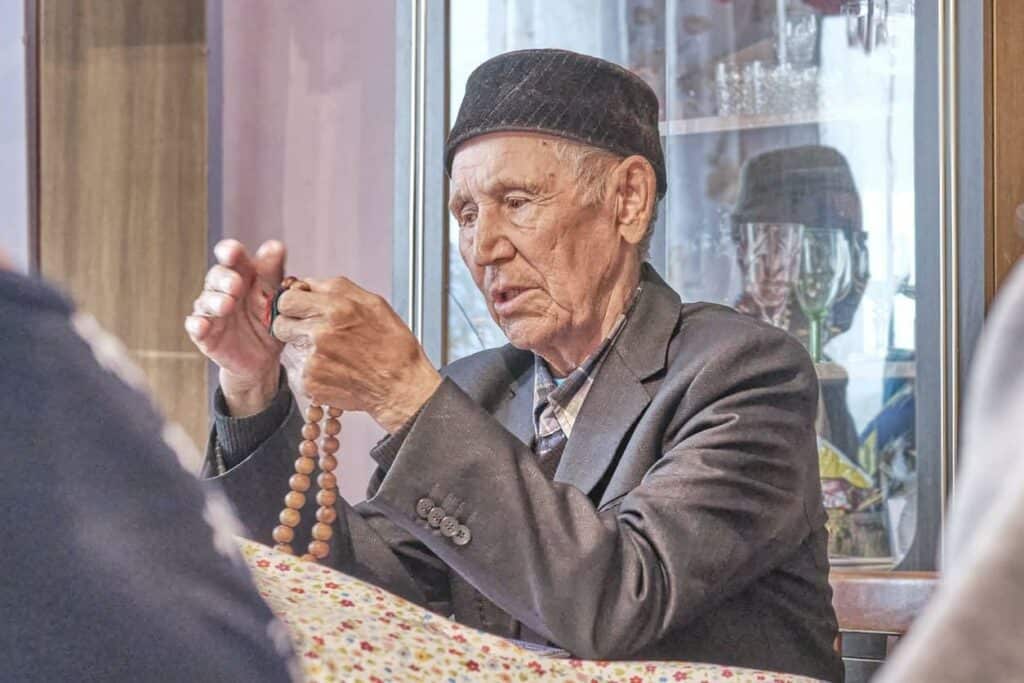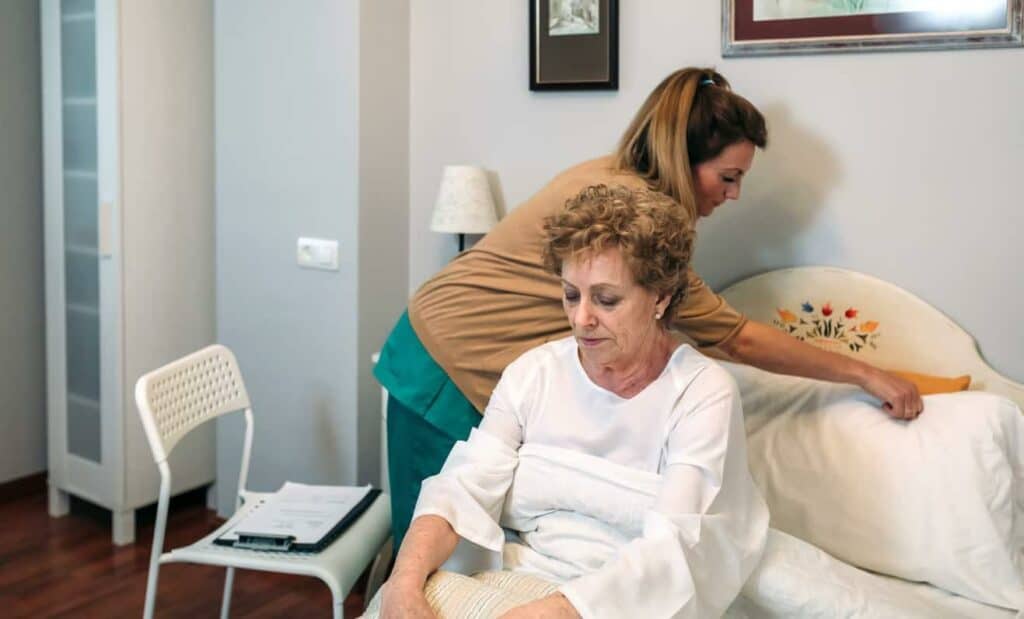The aging process is natural and inevitable for every human being. Those of us who manage to get to an older age are often considered lucky, as they would have had a life rich with experiences. Unfortunately, often in their advanced years, our loved ones happen to suffer from various ailments, and it isn’t uncommon for them to battle with serious, life-limiting illnesses.
At those times, it’s up to us – their family, to provide them with a dignified and comforting day-to-day experience while honoring their legacy. However, it isn’t easy seeing them in pain, losing their physical or cognitive abilities, and not being able to help much.

Palliative care is a service that can aid us and our beloved go through this challenging stage. Provided by a team of specialists from various disciplines of the healthcare industry, palliative care offers relief by addressing the symptoms and working in parallel with the medical treatment of our loved one’s condition.
At the heart of palliative care is the goal of relieving the patient’s suffering. To achieve this, many doctors, nurses, and therapists join forces, create and coordinate a comprehensive, individualized plan, and open lines of communication between themselves, the patient, and their family.
What do Palliative Doctors do?
Palliative healthcare professionals have expertise in different areas to address the physical, emotional, social, and spiritual needs of someone facing life-limiting illnesses.
Various doctors and specialists may be involved in providing palliative care, and the composition of the team may vary depending on the patient’s specific needs.

Some of the doctors commonly involved in palliative care are:
- Palliative Care Physicians – also known as palliative care specialists, are doctors who have specialized training in palliative medicine. They lead the palliative care team and coordinate the overall care plan.
- Primary Care Physicians – the patient’s primary care physician or family doctor may continue to be involved in palliative care, especially if they have a longstanding relationship with the patient.
- Oncologists – oncologists (cancer specialists) are often part of the palliative care team for patients with cancer. They can help manage cancer-related symptoms and coordinate with other members of the team.
- Cardiologists – if your loved one has an advanced heart disease, they may benefit from the involvement of cardiologists in palliative care to address cardiac symptoms and optimize the management of their condition.
- Neurologists may be involved in cases where neurological conditions contribute to the patient’s symptoms. They can provide expertise in managing symptoms related to the nervous system.
- Geriatricians specialize in the care of older adults. They may be involved in palliative care for elderly patients, addressing age-related health issues and optimizing the overall well-being of your beloved.

- Pain Specialists (Anesthesiologists/Pain Management Physicians) play a crucial role in managing pain, a common symptom in palliative care. They provide expertise in pain assessment and the use of various techniques for pain management.
- Psychiatrists/Psychologists – Mental health professionals, including psychiatrists and psychologists, may be involved in addressing the psychological and emotional aspects of the patient’s experience, such as anxiety, depression, or existential distress.
- Social Workers play a vital role in providing support to patients and their families. They assist with practical matters, connect patients with community resources, and offer emotional support.
- Palliative care nurses are essential team members who provide hands-on care, symptom management, and support for both the patient and their family. They work closely with the entire healthcare team.
- Chaplains/Spiritual Care Providers address the spiritual and existential needs of the patient and their family, providing emotional and spiritual guidance.

- Rehabilitation specialists (Physical/occupational therapists) may be involved to address functional limitations and mobility issues and improve the patient’s quality of life through physical and occupational therapy.
The collaboration of all these healthcare professionals makes a comprehensive and holistic approach to palliative care possible. Together, they focus on improving the overall well-being and quality of life of those facing serious illnesses.
Work with the Family
A considerable part of palliative care specialists’ work is done closely with the family members to provide comprehensive support and address their needs during the challenging experience of serious illness. This collaboration could come in many ways.
Communicate and Educate
Palliative care specialists are trained to communicate openly and honestly with family members, providing information about your loved one’s condition, prognosis, and available treatment options. They help educate family members about the goals of palliative care and what to expect in terms of symptom management and overall care.
Provide Emotional Support
Recognizing the emotional toll of serious illness on both the patient and family, palliative care specialists offer emotional support. They create a safe space for all family members to express their concerns, fears, and emotions and offer counseling or connect them with mental health professionals when needed.

Involve in Decision-Making
Palliative care specialists include family members in the decision-making process. They discuss treatment options, goals of care, and advance care planning, ensuring that the family’s values and preferences are considered when making decisions about the patient’s care.
Collaborate Care Plans
Palliative care team members join forces with the family to develop a personalized care plan that addresses the physical, emotional, social, and spiritual needs of both the patient and their loved ones. This may include managing symptoms, providing respite care, and coordinating support services.
Coordinate Care
Organizing care across different healthcare settings and with various healthcare professionals is a complex task. The palliative team works with the patient’s primary care physician, specialists, nurses, and other care providers to ensure a seamless and integrated approach to care.
Promote Family Meetings
Family meetings with the care team are moments when discussions about your loved one’s condition, treatment options, and goals of care can take place. These meetings provide opportunities for families to ask questions, share concerns, and actively participate in the care planning process.
Provide Resources
Palliative care specialists connect families with resources, support groups, and community services that can assist them in coping with the challenges of serious illness. They may provide information on financial assistance, home care services, and other practical support.
Offer Spiritual Guidance
Recognizing the importance of spiritual and existential well-being, palliative care specialists address the spiritual needs of both the patient and family. Chaplains and priests can offer prayer, facilitate religious rituals, or incorporate spiritual practices based on the family’s faith tradition. This may include reading religious texts, facilitating meditation, or guiding prayer sessions.

Provide Grief and Bereavement Support
Palliative care specialists continue to support families during the grieving process. They offer resources, counseling, and guidance to help family members cope with loss and navigate the bereavement period.
Respect Cultural and Religious Beliefs
Palliative care specialists make sure that their support aligns with the cultural and religious beliefs of the patient and their family. They work to integrate these beliefs into the care plan and decision-making process.
Overall, palliative care approaches the care of the patient and their family holistically, recognizing the interconnectedness of physical, emotional, social, and spiritual aspects.
By fostering open communication, providing support, and involving family members in decision-making, the aim is to enhance the overall well-being of both the patient and their loved ones.
Palliative care at Home or in a Facility
Palliative care can be provided in various settings, including at home or in a facility. Both options have unique advantages and considerations, and the choice often depends on personal preferences, medical needs, and the level of support available for your loved one.
Advantages of Palliative Care at Home
- Comfort and Familiarity – Your beloved is likely to find comfort in familiar surroundings and the emotional support of their family and friends. Being at home allows for a more personalized and family-oriented care environment.
- Increased Independence and Autonomy – Home-based palliative care promotes independence and autonomy for the patient. Your loved one will be able to maintain a higher sense of control over their daily routines and decisions.
- Reduced Disruption – Staying at home minimizes the disruption to your beloved’s usual daily life. They can continue living in a familiar environment without the need to relocate.

- More Family Involvement – Members of the whole family can be actively involved in caregiving, offering emotional support, and participating in decision-making. Home care allows for more extensive family participation.
- Exclusively Personalized Care – Home-based care is often more flexible and adaptable as care plans can be tailored to the specific needs and preferences of the patient and their family.
- Cost-Effectiveness – In some cases, home-based palliative care may be more cost-effective compared to institutional care, especially when considering expenses for transportation and accommodation.
Benefits of Palliative Care in a Facility
- Around the Clock Professional Care – Palliative care facilities are staffed with healthcare professionals 24/7. This ensures continuous medical supervision and immediate response to emergencies.

- Access to Palliative Care Team – Palliative care teams in facilities often include a range of professionals, as described earlier — physicians, nurses, social workers, and therapists, working collaboratively to address your beloved’s needs.
- Specialized Services – Facilities may offer specialized services and technical equipment that is not easily available at home. This includes access to advanced medical treatments, rehabilitation services, and palliative care expertise.
- Social Support – In a facility your loved one will have opportunities for social interaction with peers and better access to support groups. This can contribute to a sense of community and reduce feelings of isolation.
- Structured Environment – Facilities provide a structured and controlled environment, which may be beneficial if your beloved has complex medical needs or requires close monitoring. They will have access not only to healthcare but also to dieticians or nutrition specialists and food adapted to their diet requirements.
- Relief for Caregivers – Families may experience relief from the physical and emotional burden of caregiving when the patient is in a facility. This can help prevent caregiver burnout.
The choice of whether to receive palliative care at home or in a facility is based on the individual. It may depend on factors such as your loved one’s health status, the level of support the family is able to provide at home, the complexity of their medical needs, and their personal preferences.
Often, a combination of both home-based and facility-based care may be considered based on the patient’s changing needs throughout the palliative care journey.
Open communication between the patient, their family, and healthcare providers is crucial in making informed decisions that align with the patient’s goals and values.
If you are considering a facility setting for palliative care, have a tour of the place, learn about the types of care offered, speak with other residents and their family members, and make sure that it is a place suitable for the needs of your loved one.
Recognizing this, we at Amy’s Eden provide in-person and virtual tours and are ready to meet with you and answer all your questions. Reach out to us today at (775) 884-3336 to schedule a meeting or book a tour.




